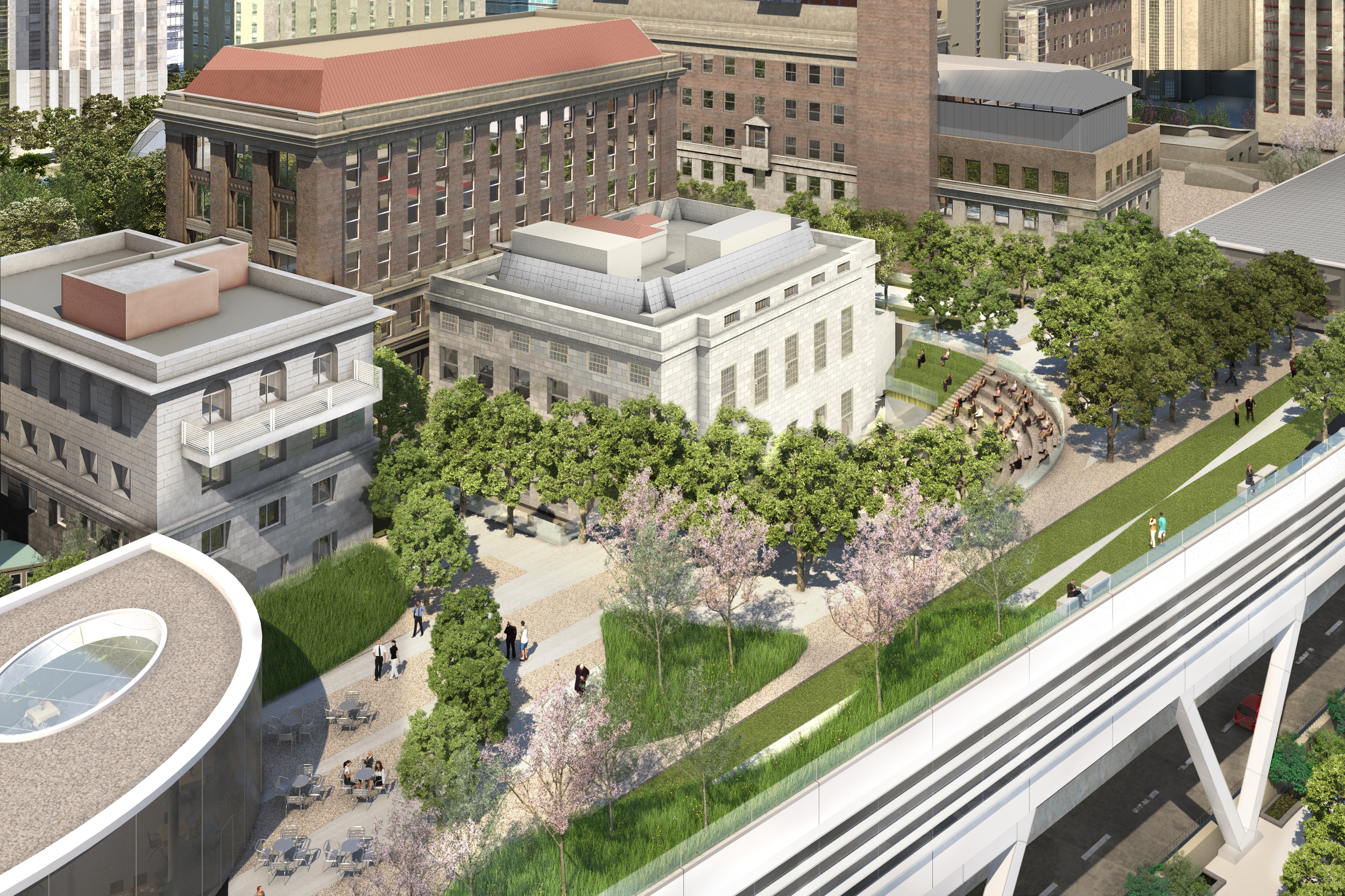$150 Million from the SNF and David Rockefeller Launch Major Campus Extension for The Rockefeller University

Dr. Tessier-Lavigne said, “These pledges recognize the longtime friendship of David Rockefeller with the late Stavros Niarchos and his family. Honoring these two remarkable men and their exceptional generosity, for which we are profoundly grateful, the new campus will be named the Stavros Niarchos Foundation–David Rockefeller River Campus.”
Designed by Raphael Viñoly Architects, the project will add two acres to the existing 14 acres of the campus by building over the FDR East River Drive, enabling the creation of several new buildings with state-of-the-art laboratories, administrative space, a conference facility, a dining commons, and an outdoor amphitheater. The new campus will renew the University’s laboratory stock, foster greater scientific collaboration both within and beyond the University, and provide new venues for public programs to advance the dissemination of science to a broader audience. As part of the project, the University will also improve and beautify the public esplanade adjacent to the campus for the benefit of the greater New York City community, and make major repairs to the seawall along the river. Architectural renderings of the project can be viewed at: http://www.rvapc.com/works/854-the-rockefeller-university-campus-master-plan-and-new-laboratory-building
“Stavros Niarchos and David Rockefeller were close friends and legendary business partners for over half a century,” said Andreas C. Dracopoulos, great nephew of the late Stavros Niarchos, co-president of the Stavros Niarchos Foundation and a member of the University’s Board of Trustees. “They did well together in the twentieth century, and now they’re joining forces again to do good in the twenty-first. Under Marc Tessier-Lavigne’s visionary leadership, Rockefeller University is at the forefront of biomedical research. This support is an investment in society’s future well-being.”
“More than a century ago, my grandfather founded what is now The Rockefeller University to pursue science for the benefit of humanity,” said David Rockefeller, who has served as a trustee of the University since 1940. “Since then, the discoveries of the University’s many renowned scientists have dramatically advanced knowledge, saved countless lives and improved health worldwide. I am honored to join with the Stavros Niarchos Foundation in strengthening this great organization in the critically important work it does.”
“We are deeply grateful to the Stavros Niarchos Foundation and David Rockefeller for enabling this transformative project, which will ensure the strength of the University’s scientific and educational programs for decades to come,” said Russell L. Carson, chair of the University’s Board of Trustees. “These two extraordinary pledges put us on the path to establishing a new campus that will enable our researchers to remain at the forefront in today’s golden age of scientific discovery.”
Dr. Tessier-Lavigne added, “Thanks to recent technological advances, a revolution is under way in genetics, brain science, biological imaging, cancer biology and immunotherapy, to name just a few fields that are being transformed. We now have the power to answer fundamental questions about the body in health and in disease that were beyond our reach just a few years ago. The Stavros Niarchos Foundation–David Rockefeller River Campus will bring leading scientists together and provide them with the resources to make breakthrough discoveries.”
In addition to thanking these two philanthropic pioneers, Dr. Tessier-Lavigne also acknowledged a number of New York City leaders, including Manhattan Borough President Gale A. Brewer, former Mayor Michael Bloomberg, and Mayor Bill de Blasio.
“We are tremendously appreciative of these leaders for their essential support,” Dr. Tessier-Lavigne said. “We are also especially grateful to our council member, Ben Kallos, for his active partnership in shaping the new campus for the benefit of both The Rockefeller University and the New York City community more broadly.”
About The Rockefeller University
Founded by John D. Rockefeller in 1901, The Rockefeller University was this nation’s first biomedical research institution. Hallmarks of the University include a research environment that provides scientists with the support they need to do imaginative science and a truly international graduate program that is unmatched for the freedom and resources it provides students to develop their capacities for innovative research. The Rockefeller University Hospital, founded in 1910 as the first center for clinical research in the United States, remains a place where researchers combine laboratory investigations with bedside observations to provide a scientific basis for disease detection, prevention, and treatment. Since the institution’s founding, The Rockefeller University has been the site of many important scientific breakthroughs. Rockefeller scientists, for example, established that DNA is the chemical basis of heredity, identified the weight-regulating hormone leptin, discovered blood groups, showed that viruses can cause cancer, founded the modern field of cell biology, worked out the structure of antibodies, devised the AIDS “cocktail” drug therapy, and developed methadone maintenance for people addicted to heroin. Throughout Rockefeller’s history, 24 scientists associated with the University have received the Nobel Prize in physiology/medicine and chemistry, and 21 scientists associated with the University have been honored with the Albert Lasker Medical Research Award. Eighteen Rockefeller University scientists have received the Canada Gairdner Award, and 20 have garnered the National Medal of Science. Currently, the University’s award-winning faculty includes five Nobel laureates, seven Lasker Award winners, 10 Canada Gairdner Award honorees, and three recipients of the National Medal of Science. Thirty-three of the faculty members are elected members of the National Academy of Sciences, and 17 are members of the Institute of Medicine. For more information, go to www.rockefeller.edu


